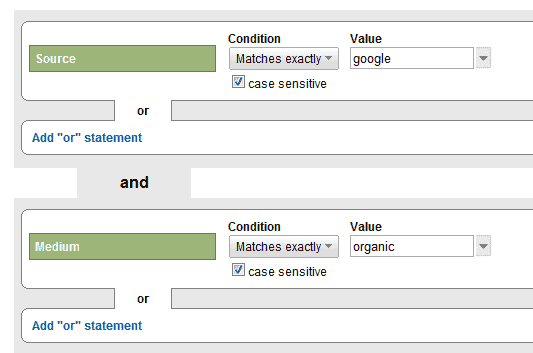I often come across businesses who want to improve their performance in Google – often through organic search.
Most of them use Google Analytics, and all want more traffic from Google.
When we begin optimising a client’s website for the search engine/s, the process begins by getting a feel for how they’re doing so far.
Apologies for the screenshots using the ‘old’ interface of Analytics, but there are bugs in the new version that haven’t yet been resolved.
The first step is to isolate Google organic traffic using a simple segment:
Remember that from this point onwards you’re only looking at the organic traffic from Google.
It’s easy to confirm this by going to Traffic Sources, Search Engines.
From here you want to know which pages are working at bringing in traffic from Google. So go to Content, Top Landing Pages.
Note that you’re more interested in landing pages than top content, as these are the pages that are ranking in the search results and generating visitors.
It’s at this point that quality starts to come into play. Take a look at the Bounce Rate column. If some of the figures surprise you, then you might want to drill down into the page to see what keywords are sending you traffic.
Click on the page name link, then choose Keyword from the third drop-down along.
From there you’ll be able to see which keywords are responsible for the high bounce rates. You’ll either understand these, or identify opportunities for improvement.
If you want to see the bigger picture, go to Traffic Sources, Keywords to see how the website as a whole is doing.
You want to focus on two main areas:
1 – keywords that you should be getting traffic for but you’re not (or not enough of it)
2 – keywords that generate large proportions of visitors with high bounce rates
You can ignore any keywords that have nothing to do with what you sell. Unless there are high volumes, you can’t use these to your advantage, and it’s not worth trying to fix an essentially benign problem.
The key is quality through relevancy.
Getting high volumes of visitors who aren’t interested in what you sell is meaningless.
Ranking highly for phrases that no-one searches for is pointless.
Effective SEO begins with identifying relevant keywords, and selecting which to target based on the number of searches and levels of competition.
Only then does the task of optimising the website begin.
Unique ideas for your business
The Demystifier puts practical ideas into your hands. You won't find them elsewhere. Original, actionable and insanely effective.




